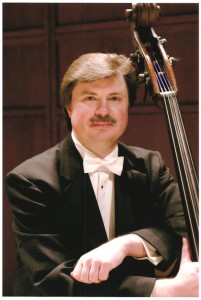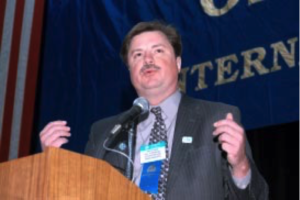
Photo credit: Michael Zirkle
My visits to Las Vegas never fail to leave me numbed by the 24-hour sensory overload that assaults you the instant you emerge from the Jetway. The din of bells and coins hitting metal trays mix in with the over-sized visual assaults, promoting magicians I’ve never heard of who are somehow famous enough to have enticed Pamela Anderson to be their assistant. In the midst of a beautiful desert, Las Vegas is a deceptive mirage.
But on my most recent trip to Vegas, the 24-hour activity of the ICSOM team had nothing to do with casinos, shows, street spectacles, or buffets. Rather, the 97th Convention of the American Federation of Musicians (June 18–20) was a show unto itself.
The ICSOM team arrived bolstered by the overwhelming support of our orchestras in our Call to Action campaign that protested a proposed increase in symphonic work dues. During this Convention, local presidents would seek us out at our table to tell us that they had indeed received petitions from their orchestras, and that they had heard the unified message of ICSOM. Our locals were receptive to our message, and we can report that the Call to Action campaign was a success and that the revenue package passed by the Convention does not include an increase in symphonic work dues.
This success is a result of the actions of the musicians of ICSOM, and we have effectively demonstrated the strength we have when we all respond to a collective call for action. Our positive message has been heard, and we can build on this effort for future causes as we continue to advocate for our musicians and the arts.
We had many allies in this effort. Our friends and colleagues from the other Player Conferences of the AFM must be thanked, as well as the many local officers who heard our message. But the main credit must go to our ICSOM delegates, our player associations, and to every musician who signed a petition or spoke to a Convention delegate. The success of this grass-roots effort should encourage every orchestral musician to believe in the power they have to effect positive change. When we engage in debate with an elevated tone, effectively stating and supporting our positions, then the strength of our message cannot be denied whether we are working with our union, our managements, or spreading a message of hope to our communities.

ICSOM Chairperson Bruce Ridge addresses delegates at the 2007 AFM Convention in Las Vegas.
Photo credit: Charles Venard
But, we must not be content with this success. Let this be the start of a renewed era of activism. More calls for action will follow. We must be ready to activate our network of communication to send letters when musicians face troubles locally. We must advocate for causes that support the message of community service that our musicians embody. We must watch the news and demonstrate our unified sense of purpose through reasoned debate and activism.
No cause will be more important over these next few years than electing delegates to the AFM Convention from within our orchestras. The 2007 Convention voted to move to a triennial meeting, so we have three years to build upon our recent success. During that time, we must become more involved in our locals. We must start attending meetings at our union halls and representing the concerns of our orchestras. We must not be content with backstage mutterings about things that are wrong. It is time for us all to rise up and become involved. Be a leader in your orchestra, a leader in your local, a leader in the Federation, and a leader in your communities!
In every issue that is before us now, apathy is our biggest enemy. I understand the pressures of life, the constraints on time, and the obligations that exhaust us all. During my frequent 20-hour days I grow weary of the task before us now. But, the response of our musicians to the Call to Action campaign has invigorated me more than I can express. More than ever, I am filled with hope for what we can accomplish together. The success of our recent efforts should fill you with hope as well, and we need you to help us spread that message. It is a right of the people that they not be deprived of hope.
The other night I was reading Music Matters: The Performer and the American Federation of Musicians, by George Seltzer. The final chapter, “What the Future Holds,” begins with this thought:
Throughout its long history, the American Federation of Musicians has been beset by a series of continuing problems. The wonder is not that these difficulties occurred, but rather that the Federation survived at all. The end of these distressful conditions is not yet in sight.
I leafed back to the front of the book to find that these words had been written in 1989, nearly two decades ago. And yet they seemed truer to me when I left Las Vegas than when I arrived.
Orchestral musicians can best prepare for the future by dedicating themselves to a renewed activism and a renewed commitment to their communities. Renew your commitment to your colleagues within your orchestra, to the community that supports your orchestra, and to the community of friends that perform nightly in every orchestra in North America. As they hear our music, let them also hear our voices. We have demonstrated that when we all speak as one, our message of hope cannot be ignored.
The subtitle of Julie Ayer’s great history of ICSOM is “How Symphony Musicians Made Labor History.” There is no doubt that those who went before us did indeed make history. And now, we just might have to do it again.
There can be no disputing that there is a long road ahead of us. Our positive message must be spread to our managements, staffs, boards, communities and locals. In my AFM Convention address, I said:
The unity within ICSOM strengthens our resolve to express our concerns and needs in a manner that avoids any vitriolic dialog. But, we do resolve to be heard. There can be no doubt that through such an overwhelming financial contribution to the well-being of the union, we have earned our place at these microphones. And with the united voice of ICSOM’s 4,000 members, we call for a new day of positive communication. The musicians of ICSOM eagerly await the opportunity to share our ideas for this road that lies ahead.
The success of the Call to Action campaign belongs to every musician in ICSOM. I encourage you to take a moment to enjoy it—but then we have many more issues to discuss.
I left Las Vegas on the red-eye, flying directly to my favorite city (non-Carolinian, that is) of Nashville and to the annual conference of the American Symphony Orchestra League. The League has announced a name change, which they humorously attribute to an effort to avoid the famously unfortunate acronym, and they will now be known as the League of American Orchestras.
At the League’s conference, I met with many managers, both in public forums and in private meetings requested in advance. I was joined by ICSOM Secretary Laura Ross as we met with the musicians who were attending the conference, as well as the Group 2 managers. It was my privilege to participate in a forum titled “Creating a Positive Environment in the Workplace,” with SSD Director Laura Brownell, ROPA President Tom Fetherston, and Carla Johnson, executive director of the Virginia Symphony.
In addressing the League’s conference, I couldn’t help but take a moment to ponder just how few people have ever had the opportunity to address both the national gatherings of the League and the AFM within 48 hours! Here are a few excerpts from those remarks:
Everywhere I go, I see opportunity. Everywhere I go, I find inspiration for what our organizations can accomplish in their communities. We are fortunate people to be in a field that provides us the chance, on a daily basis, to educate the children of our communities, to elevate the profile of our cites, to enhance the financial well-being of our business communities, and to elevate the human spirit.
We are the stewards of a precious community. We must look to the future with similar goals. We must debate our differences in the most elevated of manners, and we must change a culture that promotes any negatives in the face of such an overwhelmingly positive opportunity to serve and enhance the lives of all those we seek to touch. This we assert without hesitation: symphonic music will thrive in America as we seek to serve our communities profoundly. As the New York Times reported in large and bold print just twelve months ago, this can indeed be the “Golden Age for Classical Music.”
I must take a moment to express my personal gratitude to ICSOM Member-at-Large Steve Lester (Chicago Symphony), who will be stepping down from the ICSOM Governing Board this August. Steve is a great leader, and his dedication to the field should be emulated by us all. It has been an honor to work with him, and I am grateful for his guidance and friendship. We will miss him on the Governing Board, but we’ve no doubt that he will continue to enlighten us with his thoughts and ideas.





